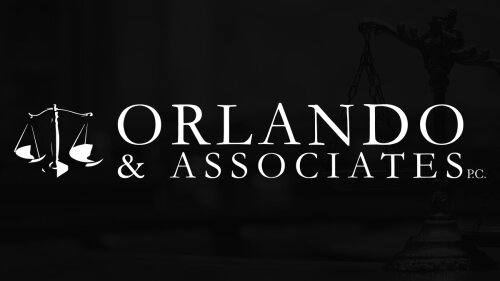Best Commercial Litigation Lawyers in Virginia
Share your needs with us, get contacted by law firms.
Free. Takes 2 min.
Or refine your search by selecting a city:
List of the best lawyers in Virginia, United States
About Commercial Litigation Law in Virginia, United States
Commercial litigation refers to the legal process for resolving disputes arising from business and commercial relationships. In Virginia, this area of law typically involves cases between companies, or between businesses and individuals, relating to contracts, partnerships, employment, trade secrets, real estate, and more. The litigation process in Virginia is governed by both state and federal rules, and these cases are usually heard in circuit courts or federal courts, depending on the nature and amount in dispute. The aim of commercial litigation is to resolve issues such as breach of contract, fraud, misrepresentation, or partnership disputes through the judicial system.
Why You May Need a Lawyer
Commercial litigation can be complex due to the intricate laws and high stakes involved. You may need a commercial litigation lawyer in Virginia if you face situations such as:
- A business partnership dispute that cannot be resolved internally
- A contract breach, such as nonpayment for goods or services
- Allegations of fraud or misrepresentation in a business transaction
- Disputes over intellectual property or trade secrets
- Employment-related lawsuits, including noncompete or nondisclosure agreement violations
- Issues regarding the sale or lease of commercial real estate
- Defense against a lawsuit filed by a vendor, customer, or competitor
- Complex insurance or liability issues within a business context
- Business dissolutions or buyout disputes
- Class action lawsuits involving your business
Having a legal expert is essential to navigating the court process, understanding applicable laws, collecting evidence, and protecting your interests throughout litigation.
Local Laws Overview
In Virginia, commercial litigation is shaped by a combination of statutory law, case law, and local court procedures. Some key aspects include:
- Virginia Business Contract Law: The Virginia Code governs contract formation, enforcement, and remedies for breaches. Many contract disputes hinge on the specific language used and Virginia's interpretation of that language.
- Civil Procedure Rules: Virginia has unique rules for filing lawsuits, serving documents, and presenting evidence, set out in the Virginia Rules of Civil Procedure. These are different from federal rules and must be carefully followed.
- Statute of Limitations: Deadlines for filing commercial lawsuits vary depending on the type of claim. For example, written contract breaches often have a five-year limit, while oral contracts may have shorter periods.
- Venue and Jurisdiction: Some disputes must be resolved in state courts, while others may be heard in federal courts if there is diversity of citizenship or a federal question.
- Damages and Remedies: Virginia law outlines compensatory, punitive, and equitable remedies for business disputes, but punitive damages are limited in certain cases.
- Alternative Dispute Resolution: Courts may order or parties may agree to mediation or arbitration before proceeding to trial, which can help resolve disputes more efficiently.
- Discovery Rules: Information exchange is governed by procedural rules to ensure both sides have access to relevant facts. Virginia courts have their own e-discovery and disclosure standards.
Understanding these Virginia-specific rules ensures the proper handling of any commercial litigation matter and avoids costly procedural missteps.
Frequently Asked Questions
What is considered a commercial dispute in Virginia?
A commercial dispute typically involves conflicts between businesses or between a business and an individual over contracts, business torts, employment, partnerships, intellectual property, or real estate.
How long do I have to file a commercial lawsuit in Virginia?
The time limit varies by case type. For example, breach of written contract claims generally have a five-year statute of limitations from the date of breach. Oral contracts are usually limited to three years. It is essential to consult with a lawyer promptly.
Can I resolve a commercial dispute without going to court?
Yes, many disputes are settled through negotiation, mediation, or arbitration. Virginia courts often encourage alternative dispute resolution before going to trial.
What should I do if my business is sued?
Do not ignore the lawsuit. Consult a qualified commercial litigation attorney immediately to review the complaint, formulate a response, and protect your interests within required deadlines.
What damages can I recover in a commercial litigation case?
Available damages may include actual economic losses, consequential damages, sometimes punitive damages, and in certain cases equitable relief like injunctions or specific performance.
Is mediation or arbitration available for commercial disputes?
Yes, mediation and arbitration are commonly used and sometimes required before trial. These methods can be faster, private, and less costly than court proceedings.
How long does commercial litigation usually take in Virginia?
Litigation timelines vary depending on the complexity of the case, amount of evidence, court schedules, and whether the dispute settles early. Some cases resolve in months, others take years.
Do I need a lawyer for a small business commercial dispute?
Even for small claims, legal representation is helpful to ensure your rights are protected and procedural requirements are met. For larger disputes, a lawyer is highly recommended.
Will the losing party pay the winning party’s attorneys’ fees?
Generally, each side pays its own legal fees unless the contract at issue provides otherwise or a statute explicitly allows for fee-shifting.
What courts handle commercial litigation in Virginia?
Depending on the size and nature of the dispute, cases may be heard in General District Court (for smaller claims), Circuit Court, or federal courts in Virginia.
Additional Resources
For those seeking further assistance or information related to commercial litigation in Virginia, the following resources may be helpful:
- Virginia State Bar: Offers lawyer referral services, educational materials, and regulatory information for both businesses and individuals.
- Virginia Court System: Provides public access to court rules, forms, schedules, and case information.
- Local County and City Bar Associations: Many regions have their own bar associations offering lawyer directories and legal clinics.
- Virginia Small Business Development Center: Offers resources regarding business operations and legal compliance tips.
- Legal Aid Societies: While typically focused on individual needs, some may assist small businesses facing legal challenges.
Government websites and local law libraries can also be valuable resources when researching specific issues or finding forms.
Next Steps
If you believe you have a commercial dispute or you have been served with a lawsuit, it is important to act quickly. Here are steps to consider:
- Document all information, contracts, correspondence, and evidence relating to your dispute.
- Contact a Virginia-licensed commercial litigation attorney to discuss your situation.
- Ask about your options for negotiation, mediation, arbitration, or court action.
- Meet all deadlines and court requirements to avoid negative judgments.
- Consider the costs and benefits of settlement versus continued litigation.
A qualified attorney can evaluate your case, help you understand your rights and obligations, and guide you toward the best possible resolution under Virginia law.
Lawzana helps you find the best lawyers and law firms in Virginia through a curated and pre-screened list of qualified legal professionals. Our platform offers rankings and detailed profiles of attorneys and law firms, allowing you to compare based on practice areas, including Commercial Litigation, experience, and client feedback.
Each profile includes a description of the firm's areas of practice, client reviews, team members and partners, year of establishment, spoken languages, office locations, contact information, social media presence, and any published articles or resources. Most firms on our platform speak English and are experienced in both local and international legal matters.
Get a quote from top-rated law firms in Virginia, United States — quickly, securely, and without unnecessary hassle.
Disclaimer:
The information provided on this page is for general informational purposes only and does not constitute legal advice. While we strive to ensure the accuracy and relevance of the content, legal information may change over time, and interpretations of the law can vary. You should always consult with a qualified legal professional for advice specific to your situation.
We disclaim all liability for actions taken or not taken based on the content of this page. If you believe any information is incorrect or outdated, please contact us, and we will review and update it where appropriate.
Browse commercial litigation law firms by city in Virginia
Refine your search by selecting a city.









